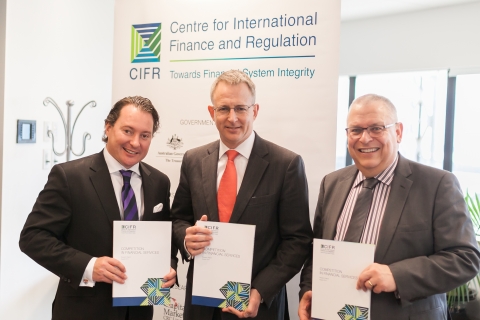Competition in Financial Services – Report Launch

The Centre for International Finance and Regulation (CIFR) was proud to launch a research report on Competition in Financial Services. The report is part of a research project led by Dr Rob Nicholls, which examines and reviews the competitive environment in financial services with a particular focus on the retail banking sector. The report is wide ranging and comprehensive, and makes several key policy recommendations. Most significantly, it recommends policies to facilitate consumers’ ability to change retail banks and the removal of the four pillars policy.
CIFR CEO Professor David R Gallagher welcomed the attendees to the event, and introduced the first speaker, the Honourable Paul Fletcher MP, Federal Member for Bradfield and Parliamentary Secretary to the Minister for Communications. Mr Fletcher said that technological innovation in financial services can simultaneously offer benefits to consumers and help retain systemic stability. He welcomed the recommendation on bank account number portability but disagreed with the proposal to remove the four pillars policy.
Professor Henry Ergas said that a competitive market is better than even the best-intentioned regulation in achieving market outcomes that consumers want and deserve. He cited three benefits of competition:
· Rivalry between services providers, which drives efficiency gains;
· Innovation and diversification benefits; and
· Increased disclosure of information, which facilitates performance benchmarking.
He said that the banks’ motivation to increase innovation lessened substantially during the global financial crisis (GFC), amid a focus on sustainability. He saw the recommendations on account switching as replacing the pre-GFC competitiveness.
Dr Rob Nicholls presented the research which recommends making it easier for consumers to compare service offerings and to switch banks. He said that the four pillars policy offers little observable benefit to consumers, and may in fact be a source of consumer disutility. The research indicates that this policy serves as a deterrent to those seeking to enter the retail banking sector in Australia. Competition and contestability arise when there are reasonably low barriers to entry and exit.
In his closing remarks, Professor Fred Hilmer said that the current regulatory regime limits the extent of competition in the banking sector. He said that greater competition encourages increased service offerings; greater segmentation of services; less price subsidies; increased performance variation; and easier access to capital for new industries. Also, it is erroneous to assume that any removal of regulation will automatically lead to an increase of risk within the sector. Moreover, attempting to completely remove risk removes the prospect for growth and innovation that competition can offer.
A copy of the report can be found here.

